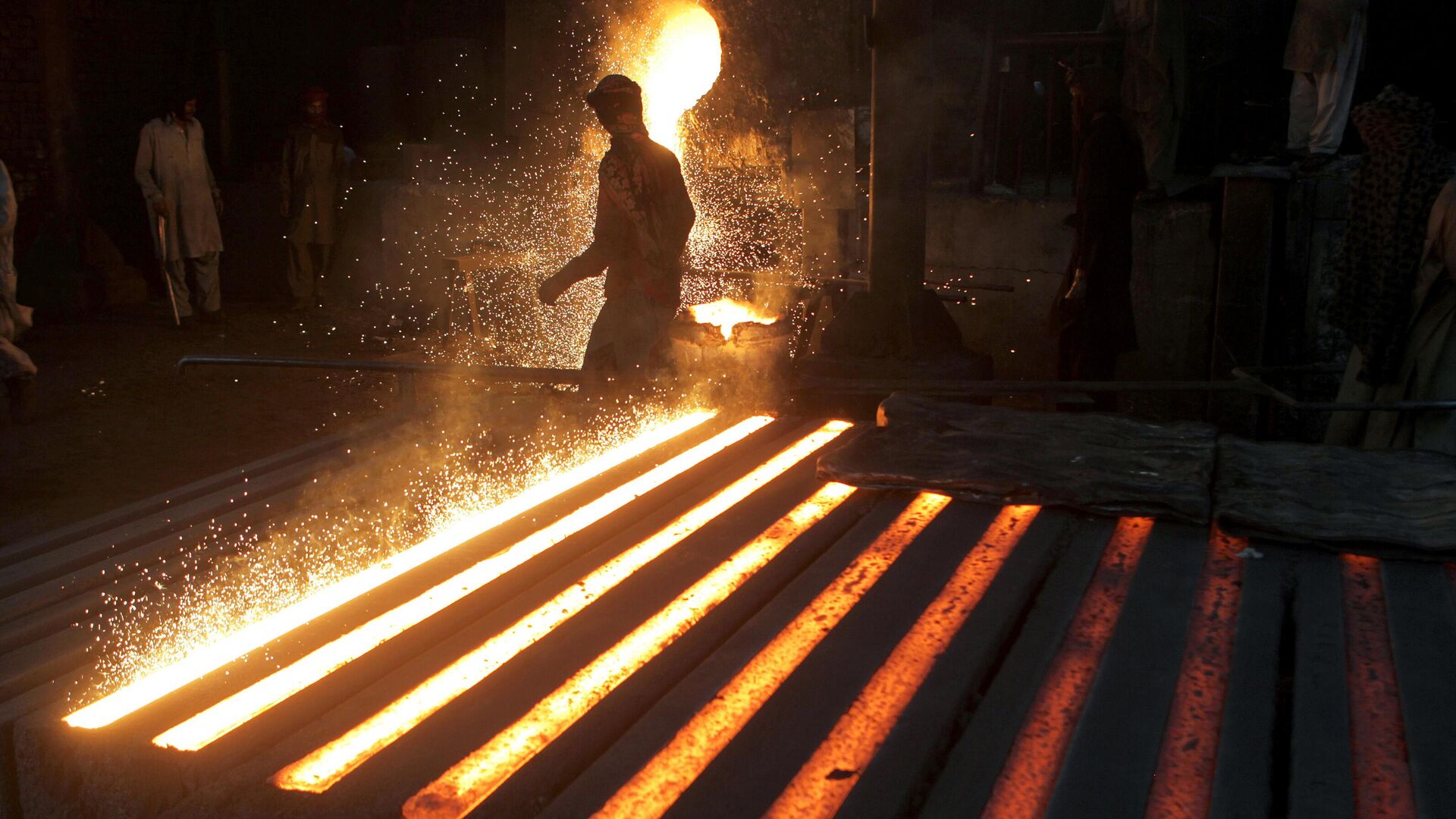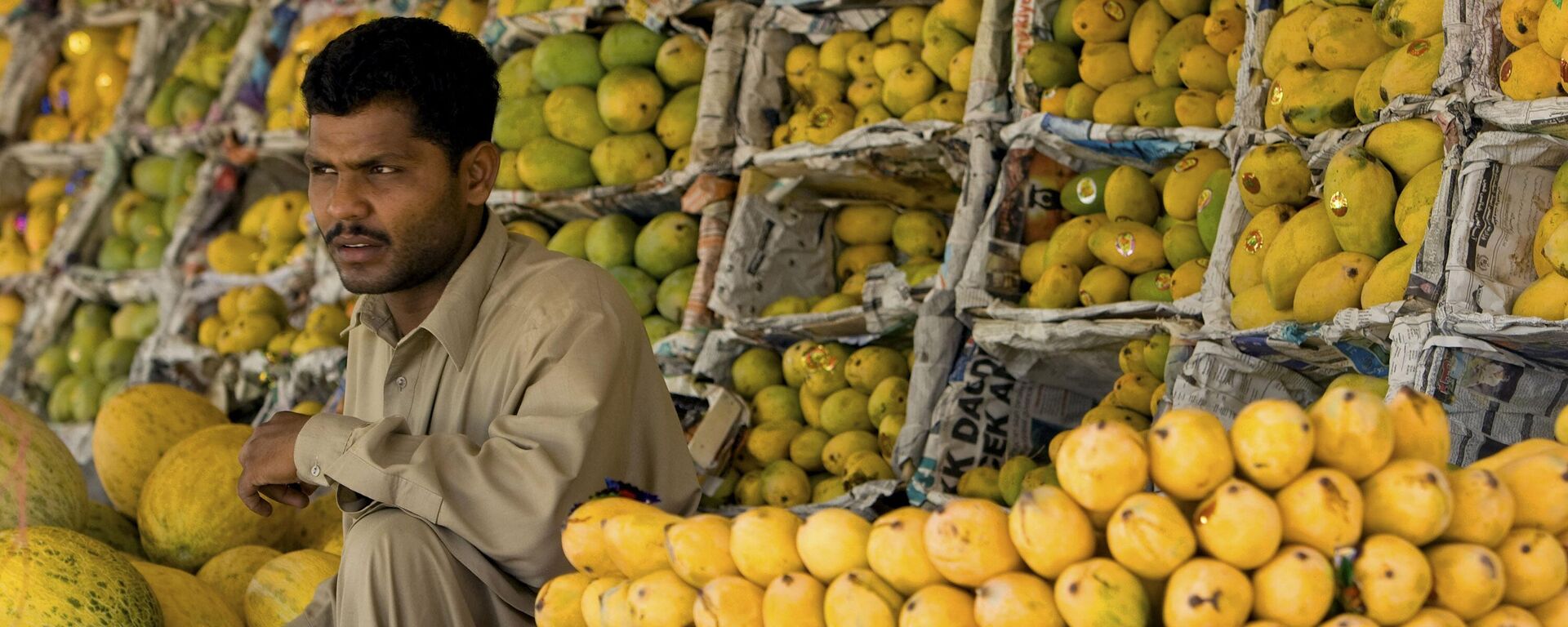https://sputniknews.in/20240731/steel-mill-revival--beyond-russias-bold-move-to-boost-pakistans-economy-7938494.html
Steel Mill Revival & Beyond: Russia's Bold Move to Boost Pakistan's Economy
Steel Mill Revival & Beyond: Russia's Bold Move to Boost Pakistan's Economy
Sputnik India
Russia is looking to help revive Pakistan Steel Mills, signaling a strategic shift in regional cooperation. This move, along with potential rail link projects between Russia and Pakistan, aims to strengthen their geopolitical alliance and economic ties.
2024-07-31T14:44+0530
2024-07-31T14:44+0530
2024-07-31T15:00+0530
business & economy
pakistan
russia
south asia
shanghai cooperation organisation (sco)
trade corridor
business
china-pakistan economic corridor (cpec)
rising economies
rail corridor
https://cdn1.img.sputniknews.in/img/07e8/07/1f/7942470_0:127:3189:1921_1920x0_80_0_0_817664ef46dedee96bfbadee267c2685.jpg
The Karachi Council on Foreign Relations recently hosted the honorable Andrey Viktorovich Fedorov, Consul General of the Russian Federation, for a talk titled "Strengthening Diplomatic and Economic Ties between Pakistan and Russia: Way Forward." During the event, the Consul General said that Russia has always promoted peace in South Asia, and wants to further engage with Pakistan on various projects including the revival of Pakistan Steel Mills (PSM), which were set up by the Soviet Union in the 70s.Meanwhile, Pakistan's Ministry of Foreign Affairs has reportedly released a proposal fostering business-to-business (B2B) cooperation to boost trade and investment with Russia, including establishing rail links which will enhance trade and business operations.Sputnik India spoke with CFO of Al-Hassna Trading Group and political observer, Arsalan Khalid, who said that Russia's offer to revitalize Pakistan Steel Mills (PSM) is part of shifting geopolitical dynamics.Moreover, he said that Russia's involvement in PSM aligns with its economic interests in expanding its industrial and technological footprint. The revitalization of the steel mills presents an opportunity for Russian companies to export technology, machinery, and expertise, thus fostering economic ties that extend beyond mere transactional relationships.The Historical Pakistan Steel MillsEstablished in the 1970s with Soviet assistance, Pakistan Steel Mills was once a cornerstone of Pakistan's industrial sector. It is still the largest industrial mega-corporation in Pakistan, having a production capacity of 3.0 million tonnes of steel and iron foundries per annum. At one stage during its lifetime, the PSM had 30,000 employees.Pakistan Steel Mills is spread out over an area of 7,550 hectares (about 75 km2) making it one of the largest industrial complexes in Pakistan as well as in South Asia. It has its own educational facilities (Pakistan Steel Cadet College and Pakistan Steel Institute of Technology), housing and residential programmes, parks and recreation facilities.However, mismanagement, political interference, and lack of modernization led to its decline. However, the potential revival of the steel mills by Russian expertise may put it back to its origins, reflecting a full-circle moment in Pakistan's industrial narrative.According to the businessman, the revival of Pakistan Steel Mills holds significant economic potential for Pakistan.Strategic Rail Links: A Game ChangerIn another recent development Pakistan's railways secretary outlined three crucial rail routes to build linkages with Russia and Central Asian states.During a meeting that took place earlier this week, the transport ministry suggested upgrading:These rail links are envisioned to connect Pakistan with Russia via Central Asia, integrating into broader initiatives like the International North-South Transport Corridor (INSTC). The INSTC aims to facilitate trade between Russia, Central Asia, and South Asia, reducing transit time and costs compared to traditional routes through the Suez Canal.Discussing the importance of establishing these rail links, Khalid told Sputnik India that for Pakistan, these rail links would provide critical connectivity to new markets, enhancing its trade prospects and reducing dependency on maritime routes.According to the businessman, Pakistan could access new markets for its exports, including textiles, agricultural products, and manufactured goods. This connectivity would also attract foreign investment, as improved infrastructure and market access would make Pakistan a more attractive destination for investors.Geopolitical Implications of Pak-Russia Economic TiesFor Pakistan this partnership provides an opportunity to diversify its alliances and reduce over-reliance on China and the United States, according to the former director.However, despite the promising prospects, several challenges must be addressed to realize the full potential of Russia's engagement with Pakistan.As pointed out by the analyst, the political landscape in Pakistan is often marked by instability and policy inconsistency, which could hinder the progress of such large-scale projects. Hence, ensuring political stability and a conducive policy environment is crucial for attracting and sustaining foreign investment.Moreover, there is bureaucratic red tape and regulatory challenges which can pose significant obstacles to foreign investments.He added that engaging in multilateral platforms, such as the Shanghai Cooperation Organization (SCO), can enhance cooperation and foster regional integration for the countries as these platforms provide opportunities for dialogue, collaboration, and the resolution of regional challenges.
https://sputniknews.in/20240407/pakistan-makes-first-ever-overland-fruit-shipment-to-russia-via-silk-road-7070208.html
pakistan
russia
south asia
china-pakistan economic corridor (cpec)
gwadar port
Sputnik India
feedback.hindi@sputniknews.com
+74956456601
MIA „Rossiya Segodnya“
2024
Aneela Rashid
https://cdn1.img.sputniknews.in/img/07e6/0c/0d/74548_0:0:485:484_100x100_80_0_0_821526e967ae85d041e2d30ee34fa1de.jpg
Aneela Rashid
https://cdn1.img.sputniknews.in/img/07e6/0c/0d/74548_0:0:485:484_100x100_80_0_0_821526e967ae85d041e2d30ee34fa1de.jpg
News
en_IN
Sputnik India
feedback.hindi@sputniknews.com
+74956456601
MIA „Rossiya Segodnya“
Sputnik India
feedback.hindi@sputniknews.com
+74956456601
MIA „Rossiya Segodnya“
Aneela Rashid
https://cdn1.img.sputniknews.in/img/07e6/0c/0d/74548_0:0:485:484_100x100_80_0_0_821526e967ae85d041e2d30ee34fa1de.jpg
pakistan, russia, south asia, shanghai cooperation organisation (sco), trade corridor, business, china-pakistan economic corridor (cpec), rising economies, rail corridor, pakistan railways, gwadar port
pakistan, russia, south asia, shanghai cooperation organisation (sco), trade corridor, business, china-pakistan economic corridor (cpec), rising economies, rail corridor, pakistan railways, gwadar port
Steel Mill Revival & Beyond: Russia's Bold Move to Boost Pakistan's Economy
14:44 31.07.2024 (Updated: 15:00 31.07.2024) Russia is looking to help revive Pakistan Steel Mills, signaling a strategic shift in regional cooperation. This move, along with potential rail link projects between Russia and Pakistan, aims to strengthen their geopolitical alliance and economic ties.
The Karachi Council on Foreign Relations recently hosted the honorable Andrey Viktorovich Fedorov, Consul General of the Russian Federation, for a talk titled "Strengthening Diplomatic and Economic Ties between Pakistan and Russia: Way Forward."
During the event, the Consul General said that Russia has always promoted peace in South Asia, and wants to further engage with Pakistan on various projects including the revival of Pakistan Steel Mills (PSM), which were set up by the Soviet Union in the 70s.
Meanwhile,
Pakistan's Ministry of Foreign Affairs has reportedly released a proposal fostering business-to-business (B2B) cooperation to
boost trade and investment with Russia, including establishing rail links which will enhance trade and business operations.
Sputnik India spoke with CFO of
Al-Hassna Trading Group and political observer,
Arsalan Khalid, who said that Russia's offer to revitalize
Pakistan Steel Mills (PSM) is part of shifting
geopolitical dynamics.
"This offer can be seen as a response to the shifting geopolitical dynamics in the region, particularly the increasing influence of China and the strategic partnership between Pakistan and China under the China-Pakistan Economic Corridor (CPEC). By engaging with Pakistan economically, Russia can diversify its partnerships in South Asia and expand on its traditional allies," Khalid stated.
Moreover, he said that Russia's involvement in PSM aligns with its economic interests in expanding its industrial and technological footprint. The revitalization of the steel mills presents an opportunity for Russian companies to export technology, machinery, and expertise, thus fostering economic ties that extend beyond mere transactional relationships.
The Historical Pakistan Steel Mills
Established in the 1970s with Soviet assistance, Pakistan Steel Mills was once a cornerstone of Pakistan's industrial sector. It is still the largest industrial mega-corporation in Pakistan, having a production capacity of 3.0 million tonnes of steel and iron foundries per annum. At one stage during its lifetime, the PSM had 30,000 employees.
Pakistan Steel Mills is spread out over an area of 7,550 hectares (about 75 km2) making it one of the largest industrial complexes in Pakistan as well as in South Asia. It has its own educational facilities (Pakistan Steel Cadet College and Pakistan Steel Institute of Technology), housing and residential programmes, parks and recreation facilities.
However, mismanagement, political interference, and lack of modernization led to its decline. However, the potential revival of the steel mills by Russian expertise may put it back to its origins, reflecting a full-circle moment in Pakistan's industrial narrative.
According to the businessman, the revival of Pakistan Steel Mills holds significant
economic potential for Pakistan.
"Firstly, it could create thousands of jobs, stimulate local industries, and reduce Pakistan's dependence on imported steel. The operationalization of PSM would also have a multiplier effect on related industries, such as construction, automotive, and manufacturing sectors, thereby boosting overall business and economic growth," Khalid said.
Strategic Rail Links: A Game Changer
In another recent development Pakistan's railways secretary outlined three crucial rail routes to build linkages with Russia and Central Asian states.
During a meeting that took place earlier this week, the transport ministry suggested upgrading:
1.
The Quetta-Taftan rail network;
2.
The Kohat-Karachi rail network;
3.
The Minelik Express rail route between Reko Diq with Gwadar to gain access to markets of Azerbaijan and Russia.
These rail links are envisioned to connect Pakistan with Russia via Central Asia, integrating into broader initiatives like the
International North-South Transport Corridor (INSTC). The INSTC aims to
facilitate trade between Russia, Central Asia, and South Asia, reducing transit time and costs compared to traditional routes through the
Suez Canal.
Discussing the importance of establishing these rail links, Khalid told Sputnik India that for Pakistan, these rail links would provide critical connectivity to new markets, enhancing its trade prospects and reducing dependency on maritime routes.
"The rail links would support Pakistan's vision of becoming a regional trade hub, enhancing its strategic location at the crossroads of South Asia, Central Asia, and the Middle East," he added.
According to the businessman, Pakistan could access new markets for its exports, including textiles, agricultural products, and manufactured goods. This connectivity would also attract foreign investment, as improved infrastructure and
market access would make Pakistan a more attractive destination for investors.
Geopolitical Implications of Pak-Russia Economic Ties
"For Russia, this collaboration represents a strategic balancing act, diversifying its partnerships in a region traditionally dominated by China and the United States," former regional director of Pakistan Council of Scientific & Industrial Research (PCSIR) and political observer, Shahid Abdul said.
For Pakistan this partnership provides an opportunity to
diversify its alliances and reduce over-reliance on China and the United States, according to the former director.
"The cooperation with Russia can serve as a leverage point in Islamabad's foreign policy, providing Pakistan with greater strategic autonomy," Abdul stated.
However, despite the promising prospects, several challenges must be addressed to realize the full potential of Russia's engagement with Pakistan.
As pointed out by the analyst, the political landscape in Pakistan is often marked by instability and policy inconsistency, which could hinder the progress of such large-scale projects. Hence, ensuring political stability and a conducive policy environment is crucial for attracting and sustaining foreign investment.
Moreover, there is bureaucratic red tape and regulatory challenges which can pose significant obstacles to foreign investments.
"The region's complex geopolitical landscape, characterized by tensions between Pakistan and its neighbors, could impact the success of these initiatives, hence, maintaining a neutral and balanced approach in its foreign policy will be essential for Pakistan to navigate these tensions and foster regional cooperation," Abdul said.
He added that engaging in multilateral platforms, such as the Shanghai Cooperation Organization (SCO), can enhance cooperation and foster regional integration for the countries as these platforms provide opportunities for dialogue, collaboration, and the resolution of regional challenges.



